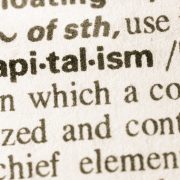Is Joe Biden a moderate or a radical? He says businesses “have a responsibility to their workers, their community, to their country”—a truism. But he has also called for “an end to the era of shareholder capitalism.” He says it’s “untrue and a farce” that a company’s primary responsibility is to generate returns for shareholders.
In reality, corporations do enormous social good precisely by seeking to generate returns for shareholders. They give investors a way of putting money into promising businesses without risking personal liability for the businesses’ broader obligations, such as debts and lawsuits. By limiting investors’ exposure to the risks of business failure, the corporate structure has been overwhelmingly successful in generating the investment required for economic growth and increasing standards of living.
Over the past 25 years, living standards have improved as annual global output has grown from around $39.2 trillion to $80 trillion because of “economic freedom underpinned by free-market capitalism,” according to the Heritage Foundation’s Index of Economic Freedom for 2020. In economically free societies people live longer, are healthier, take better care of the environment, and push scientific innovation further.
Mr. Biden’s politicized “stakeholder capitalism” would imperil that prosperity. When government imposes noneconomic obligations on firms and thereby diminishes their focus on profit, it reduces the incentive to invest and the capital available for growth. For the broader community that means fewer jobs, lower pay, less innovation, fewer products and less prosperity in general. It would harm retirees who count on shareholder returns for income from their pensions, 401(k)s, individual retirement accounts, mutual funds, annuities and death benefits.
As for the “responsibility” Mr. Biden wants to impose on corporations, they already fulfill it. He would refocus corporate responsibility on employees’ well-being, but every entrepreneur knows a loyal workforce is essential for success. So companies seek to strike a balance between efficiency and workers’ interests. And a company that doesn’t make a profit can’t afford to keep workers employed for long.
As for obligations to the community, every company already needs consumer support to succeed and consumers are free to vote with their dollars for businesses they perceive as socially responsible. But if social responsibility becomes more important than making a profit, the company will fail. Businesses are better-positioned to weigh consumers’ preferences and profitability than politicians are.
Shareholder capitalism created the greatest period of prosperity in human history, bolstering freedom and quality of life. When you strike at its ability to encourage investment and profit, you strike at the good its done for stakeholders.
That Mr. Biden believes otherwise is something to keep in mind when heading to the polls—or the mailbox—this fall.
Mr. Puzder is a former CEO of CKE Restaurants. This article first appeared at wsj.com













